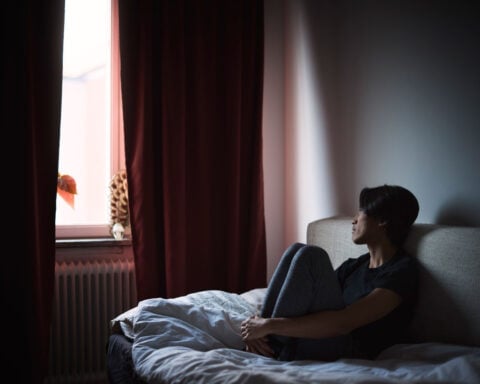The COVID-19 pandemic dealt a crushing blow to many women's sex drives - one that hasn't recovered even years later. Studies show female desire dropped steeply since lockdowns began and remains suppressed. But why are women still struggling with lagging libido? And how can couples reignite passion after the prolonged intimacy rut?
Experts say pandemic-fueled stress overloaded already-taxed women juggling remote work, childcare, and household chores alone. With school and support gone, sex often slipped to the bottom of a lengthy to-do list. But even as life regains normalcy, many couples remain stuck in a sexual disconnect.
The good news? Reigniting fading female desire is possible through compassionate effort. While the dry spell feels awkward to break, experts have concrete advice on rebooting passion after this relationship crisis. Scheduling intimate times, planning creative foreplay, addressing pain problems, improving communication about sexual needs - these steps can adapt sexuality to the post-pandemic world.
According to a meta-analysis published last month in BMC Public Health that analyzed 21 different studies, sexual function has decreased substantially in both genders after the pandemic began. But for women in particular, desire dropped off dramatically and has not rebounded even close to pre-pandemic levels.
"I've been hearing about this trend since the first couple of months of the pandemic, and it has definitely continued," said Vanessa Marin, a licensed marriage and family therapist based in Santa Barbara. Marin, who co-authored the book Sex Talks: The Five Conversations That Will Transform Your Love Life, said there are ways for couples to work together to address the ongoing lack of desire.
"Being in a relationship really is like working together as a team to figure out, 'Hey, what is it that we're both wanting and how do we work together to get it?" she said.
Researchers have attributed the decline in female sex drive largely to the incredible stress load caused by the pandemic. "It makes sense that people experienced a lot of difficulties during this time because you had these major life disruptions that didn't necessarily go away when the world reopened," said Dr. Justin Lehmiller, a research fellow at the Kinsey Institute at Indiana University.
Lehmiller, who also hosts the "Sex and Psychology Podcast," explained that when human beings are under serious or prolonged stress, their body shut down arousal pathways automatically. Beyond general pandemic anxiety over health and safety concerns, many women in relationships faced hugely increased burdens when it came to household and childcare responsibilities with the loss of school, childcare, and outside support systems.
"The pandemic brought issues of mental load and mental labor really to the forefront in a way that it never has been before," said Marin. Women disproportionately carried these stresses by working remotely full-time, overseeing virtual school for kids, taking on more domestic chores, and losing outlets like childcare help and social activities.
"It makes sense that women who took on a greater share of domestic labor — all while simultaneously working from home — would start to feel like intimacy with their partner was just another chore to check off the list, another demand among seemingly endless demands," Marin said.
Even as pandemic restrictions finally eased, allowing life to resume some sense of normalcy, many couples remained stuck in an intimacy rut, with lagging female sexual desire a primary issue. "I think we've sort of normalized sexual difficulties for women," said Deborah Fox, a licensed clinical social worker and sex therapist based in Washington, D.C.
She said the key is for couples to actively work on reconnecting physically, even if it doesn't initially lead to actual sex. "That regular rhythm of activity is required because otherwise, drift takes over," Fox said. And if you're already drifting apart from the pandemic, it can feel extremely awkward to get back into physical intimacy."
Fox suggests that couples designate regular times just for physical intimacy like cuddling, kissing, or hand-holding without pressure for full sex. Building in fun, creative foreplay days ahead of time can also help women get back in touch with their responsive sexual desires.
Marin lays out a few different areas for women to explore if they want to address their lagging libido. First, truly examine your emotional connection with your partner—are you feeling resentment, disconnection, or a lack of appreciation? Working on those core relationship issues together or with a couples' counselor could remove obstacles to physical intimacy.
"The vast majority of people describe their sex life as boring, routine, predictable, and that there's nothing in it for them," Marin said. Figuring out what would make sex more fulfilling, exciting, and rewarding is an excellent place to start rebuilding that desire. Experimenting with new positions, scenarios, toys, or role-play may reveal new avenues of pleasure.
Finally, pain is also a major but often unaddressed issue, Marin said. "The research has shown that 30% of women experienced pain the last time they had sex, which is a mind-boggling number," she said. "If you're experiencing any pain or discomfort during sex regularly, it makes zero sense to crave it, so addressing sexual pain is another great starting point for a lot of people."
Seeing your gynecologist or a pelvic floor physical therapist can be extremely helpful in identifying and treating causes of painful sex, Marin advised. A sex therapist can also work with couples on techniques, positions, and relaxation practices to minimize discomfort. Finding solutions to that pain can open the door to reigniting passion.
While the pandemic clearly triggered a steep decline in both desire and satisfaction for many women in long-term relationships, experts say it is possible to regain intimacy through open communication, professional support when needed, and an understanding that sexuality may look different than it did early on.
Through teamwork, empathy, creativity, and compassion for each other, couples can adapt and reconnect in the "new normal" post-pandemic life, even after an extended dry spell. Here are tips from experts on reigniting the spark:
Schedule intimacy times
"That regular sort of rhythm of activity is what's required because otherwise, drift takes over," said Fox. Set weekly or bi-weekly times to be physically close, with no pressure for sex. To reconnect, use intimate gestures like holding hands, nuzzling, gentle touches, or kissing.
Plan creative foreplay
Build desire through thoughtful build-ups like flirty texts during the workday, coy invitations to a hotel rendezvous, or ritual date nights that involve playfulness and sensory teasing. Cook a meal together, then feed each other bites blindfolded. Exchange massages working up to erotic areas. Recapture the sense of spontaneity missing from your sex life.
Talk about sex - a lot.
Have honest, judgment-free dialogues about your sexual needs and desires, even if awkward at first. Discuss new things you'd like to try in bed and how to make sex more pleasurable. Compromise if certain acts feel uncomfortable. This builds intimacy beyond just physical release.
Address relationship issues
If you're harboring resentment, feeling neglected, or experiencing chronic conflict in your relationship, work through communication problems first before trying to force sexual connection. Seek counseling to air grievances, learn compromise tools, and reboot your partnership.
Explore medical or pain issues.
Seek professional support from your gynecologist, pelvic floor specialists, or a sex therapist to identify and treat medical problems like sexual pain conditions or low hormone levels that may be sabotaging your enjoyment of sex. Addressing pain and physiological roadblocks is critical.
While the pandemic clearly triggered a steep decline in both desire and satisfaction for many partnered women, experts believe it possible to regain intimacy through compassionate effort. With open and honest communication about needs, willingness to seek professional help as required, and concerted time spent prioritizing physical connection - even when not "in the mood" at first - couples can adapt and thrive sexually in the post-pandemic era.

 Trump has begun another trade war. Here's a timeline of how we got here
Trump has begun another trade war. Here's a timeline of how we got here
 Canada's leader laments lost friendship with US in town that sheltered stranded Americans after 9/11
Canada's leader laments lost friendship with US in town that sheltered stranded Americans after 9/11
 Chinese EV giant BYD's fourth-quarter profit leaps 73%
Chinese EV giant BYD's fourth-quarter profit leaps 73%
 You're an American in another land? Prepare to talk about the why and how of Trump 2.0
You're an American in another land? Prepare to talk about the why and how of Trump 2.0
 Chalk talk: Star power, top teams and No. 5 seeds headline the women's March Madness Sweet 16
Chalk talk: Star power, top teams and No. 5 seeds headline the women's March Madness Sweet 16
 Purdue returns to Sweet 16 with 76-62 win over McNeese in March Madness
Purdue returns to Sweet 16 with 76-62 win over McNeese in March Madness








